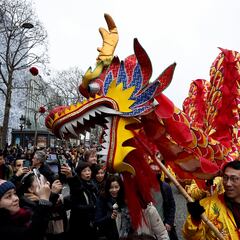When is Lunar New Year and what does it mean?
The Lunar New Year celebrates the coming of spring and the start of a new year. In 2024, this important East Asian holiday is celebrated on February 10.


The Lunar New Year, also known as Chinese New Year or the Spring Festival in China, is an important cultural and traditional festival celebrated by various East Asian communities around the world. It’s based on the lunar calendar and usually falls between late January and mid-February each year. In 2024, the holiday will be celebrated on February 10.
The specific date of Chinese New Year changes from year to year because it is determined by the lunar calendar, which is based on the cycles of the moon. The festival takes place on the second new moon after the winter solstice and ends on the full moon 15 days later.
READ ALSO: When is Chinese New Year 2024?
Chinese New Year greetings from 24 giant panda cubs in China's Sichuan. #panda #giantpanda #HappyNewYear #LunarNewYear pic.twitter.com/E6OuiAN9v2
— China Xinhua News (@XHNews) February 7, 2024
The year of the dragon
Each year in the lunar calendar is associated with one of the twelve Chinese zodiac animals. The animal of the year is believed to influence the personality traits of those born during that year, as well as the events of the coming year. In 2024, the dragon, considered one of the most powerful signs in the Chinese zodiac, takes center stage.
The significance of Lunar New Year varies across different cultures, but there are some common themes, such as renewal, prosperity, and good fortune.
These stop-motion dolls wish you good luck in the Year of the Dragon. #SpringFestival2024 pic.twitter.com/JhJekdtUEY
— CGTN (@CGTNOfficial) February 5, 2024
READ ALSO: 2024 Mardi Gras in New Orleans, what to know
Lunar New Year practices
The holiday marks the beginning of the new year in many East Asian cultures, including Chinese, Vietnamese, Korean, and Tibetan communities. It’s a time for families to come together and celebrate with traditions and rituals.
Here are some customs that are observed during the holiday.
Family reunions
Families gather for dinner on the eve of the Lunar New Year, known as “Chinese New Year’s Eve.” It’s considered the most important meal of the year, and family members travel long distances to be together.
Honoring ancestors
Remembering ancestors is an essential aspect of Lunar New Year celebrations. Families pay tribute to their forbears by offering prayers, burning incense, and setting up altars with offerings of food and other items.
Traditional foods
Special foods are typically prepared and enjoyed during the Lunar New Year, including dumplings, noodles, and rice balls. Each of these dishes carry symbolic meanings related to luck, prosperity, and good fortune.
Customs and rituals
Related stories
Lunar New Year is rich in traditions and customs, including red decorations and lanterns, colorful dragon and lion dances, fireworks and firecrackers, giving and receiving red envelopes containing money, and cleaning and decorating homes to sweep away bad luck and make way for good fortune in the new year.
The Lunar New Year, much like the Gregorian New Year, is a time of joy, reflection, celebration, and hope for a prosperous and auspicious year ahead. The festival is filled with rich traditions that have been passed down for generations, and is celebrated by millions of people around the world.

